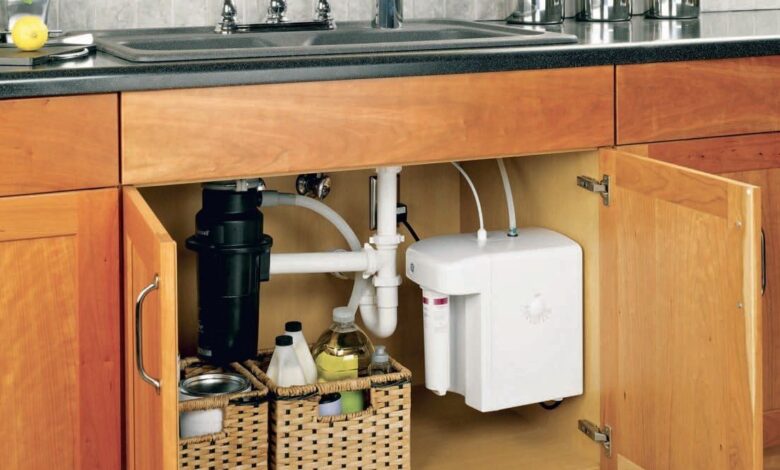Freshen Up Your Kitchen with a Kitchen Sink Water Filter

Introduction
Welcome to the ultimate guide to kitchen sink water filters! In this comprehensive article, we’ll dive deep into everything you need to know about these innovative devices that can transform the way you experience your kitchen. From understanding the importance of water filtration to choosing the right filter for your needs, we’ve got you covered.
Understanding the Kitchen Sink Water Filter
Water is an essential element in every kitchen, but its quality is often overlooked. A kitchen sink water filter is a must-have accessory that ensures the water you use for cooking and drinking is clean, pure, and free from impurities.
Water filters are designed to remove contaminants such as chlorine, sediment, heavy metals, and other harmful substances that may be present in tap water. By installing a filter directly onto your kitchen sink faucet, you can enjoy fresh, great-tasting water on demand.
Choosing the Right Filter for Your Kitchen
When it comes to selecting a kitchen sink water filter, there are several factors to consider. Here are some key points to keep in mind:
Types of Water Filters
- Under Sink Filtration Systems: These filters are installed beneath the kitchen sink and connect to the existing water supply.
- Faucet-Mounted Filters: These filters attach directly to the faucet, providing instant filtration without the need for complex installation.
- Countertop Filters: These portable filters sit on the kitchen counter and are ideal for renters or those who don’t want to modify plumbing.
Filtering Mechanisms
- Reverse Osmosis: This process uses a semipermeable membrane to remove impurities from water.
- Activated Carbon: Carbon filters trap contaminants through adsorption, effectively removing odors and improving taste.
- UV Purification: UV light is used to sterilize water by destroying bacteria and viruses.
Capacity and Flow Rate
Consider the size of your household and your daily water usage when choosing a filter. Opt for a model with adequate capacity and a flow rate that meets your needs.
Installation and Maintenance Tips
Installing a kitchen sink water filter is a straightforward process that can typically be completed in a few simple steps. Most filters come with detailed instructions and all the necessary hardware for installation.
Installation Steps
- Shut off the water supply to the sink.
- Disconnect the existing faucet aerator.
- Install the filter according to the manufacturer’s instructions.
- Test the filter for leaks and proper functionality.
Maintenance Guidelines
- Regular Filter Replacement: Follow the manufacturer’s recommendations for replacing filter cartridges to ensure optimal performance.
- Cleaning: Periodically clean the filter housing and faucet aerator to prevent buildup of sediment and debris.
- Sanitization: Use approved sanitizing solutions to disinfect the filter components and maintain water quality.
Benefits of Using a Kitchen Sink Water Filter
Investing in a kitchen sink water filter offers a multitude of benefits for both you and your family:
- Improved Water Quality: Enjoy clean, fresh-tasting water for drinking, cooking, and washing fruits and vegetables.
- Healthier Lifestyle: Eliminate harmful contaminants and reduce your exposure to potentially harmful substances.
- Environmental Impact: Reduce plastic waste by eliminating the need for bottled water.
- Cost Savings: Save money in the long run by avoiding the recurring expense of purchasing bottled water.
FAQs (Frequently Asked Questions)
Q: How often should I replace the filter cartridge?
Filter replacement frequency varies depending on the model and usage, but it’s typically recommended to replace the cartridge every 6 to 12 months for optimal performance.
Q: Can I install a kitchen sink water filter myself, or do I need to hire a professional?
Most kitchen sink water filters come with detailed installation instructions, making it possible for DIY installation. However, if you’re not comfortable with plumbing tasks, hiring a professional plumber is always an option.
Q: Will a water filter remove fluoride from my tap water?
Some water filters, such as reverse osmosis systems, are capable of removing fluoride from tap water. Check the specifications of the filter to ensure it meets your specific requirements.
Q: Do kitchen sink water filters reduce water pressure?
In most cases, modern water filters are designed to maintain adequate water pressure while providing effective filtration. However, it’s essential to choose a filter with an appropriate flow rate for your household’s needs.
Q: Are kitchen sink water filters compatible with all faucet types?
While most filters are designed to be compatible with standard faucets, it’s essential to check the specifications of the filter and ensure compatibility with your faucet before purchasing.
Q: Can I use a kitchen sink water filter with well water?
Yes, many kitchen sink water filters are suitable for use with well water. However, it’s essential to test your water quality and choose a filter that can effectively remove any specific contaminants present in your well water.
Conclusion
A kitchen sink water filter and green filter is a simple yet powerful addition to any kitchen, providing clean, great-tasting water for drinking, cooking, and more. By following the guidelines outlined in this article, you can select, install, and maintain a filter that meets your needs and improves your overall quality of life.




